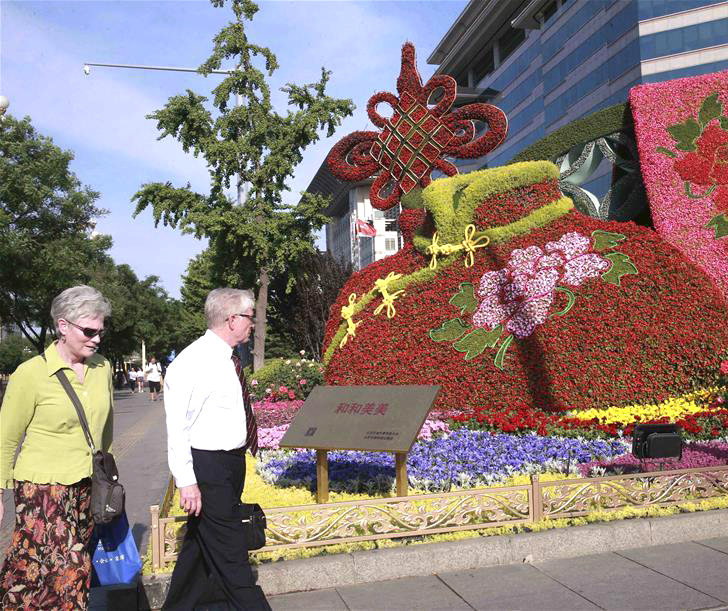‘Belt and Road’ to reshape global economic geography

Two tourists walk past a flower exhibit on the street of Xidan in downtown Beijing on May 7. Themed “He He Mei Mei” (literally “harmony and happiness”), the cheongsam-shaped flower exhibit was installed to welcome delegates to the Belt and Road Forum for International Cooperation that is slated to kick off on May 14.
The Belt and Road Forum for International Cooperation, which is slated to kick off in Beijing on May 14, will mark a milestone in the history of Chinese diplomacy and become a highlight of China’s efforts to promote world development.
The forum is significant in three ways.
First, the “Chinese Proposal” will guide international cooperation. The “Belt and Road” (“B&R”) initiative was proposed by China for the sake of international cooperation. Themed exactly on the initiative, the forum will be the highest-level international conference of its kind that China has ever hosted. It will inject stronger positive energy into the world economy to charge through the downturn and overcome the backlash against globalization.
Moreover, the “Chinese Proposal” will result in far-reaching plans for international cooperation. Since the “B&R” initiative was put forward, it has been made explicit that the initiative applies to all developed and developing countries and to all nations, regardless of whether they are along or outside the routes.
In addition, the “Chinese Proposal” will be upgraded from regional to international cooperation. The forum has attracted a total of more than 1,200 participants from government, academic, business, finance and media circles. They are from 110 countries on the continents of Europe, Asia, North America, Latin America and Africa. The “B&R” initiative has gone beyond geographical limitations, gaining recognition from most countries and establishing itself as a truly globalized cooperation platform.
Through more than three years of development, the initiative has progressed from a theoretical concept to innovative practices, entering a new stage of comprehensively advancing pragmatic cooperation. The forum will have the following highlights.
First, there will be more and higher-level cooperation agreements reached. Currently, China has built cooperative ties with more than 40 countries and international organizations on the initiative. The number is expected to double during the forum.
Meanwhile, it will drive parties involved to connect policies and measures in depth and consult with each other to settle key cooperation areas for the next stage, therefore elevating the level of overall regional development.
Furthermore, the forum will ensure the practical and effective implementation of the initiative. It will bring into being comprehensive action plans for cooperation in the upcoming years. Hopefully, it will become a mechanism similar to the G20, laying the groundwork for concrete actions.
Last but not least, the forum represents a solid step toward global economic interconnectivity. The “B&R” initiative is a large-scale, profound and interconnected revolution to reshape the world economic geography. The key is to realize infrastructure interconnectivity.
It is anticipated that related Chinese departments will formulate nearly 20 action plans together with their counterparts of countries along the routes. They will touch upon such fields as infrastructure, energy and resources, capacity cooperation, and trade and investment.
This will reshape the “B&R” economic geography and help achieve integrated, joint development of Europe, Asia and Africa, thus reshaping world economic geography, propelling the modernization of global infrastructure and boosting world economy.
The forum will not only take the construction of the “B&R” initiative to a new development stage but also signal that China will be a more confident pioneer in economic globalization.
This article was translated from People’s Daily Overseas Edition. Hu Angang and Zhang Xin are from the Institute for Contemporary China Studies at Tsinghua University.
